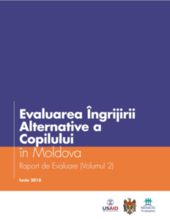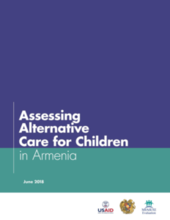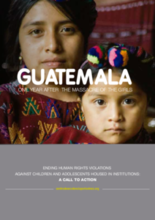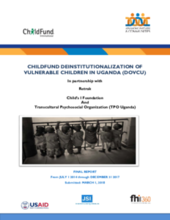Displaying 251 - 260 of 691
This report, in the Moldovan langauge, presents the findings of an assessment workshop aimed at informing action planning to address priority needs identified in alternative care for children in Moldova.
This report presents the findings of an assessment workshop aimed at informing action planning to address priority needs identified in alternative care for children in Moldova.
This report presents the findings of an assessment workshop aimed at bringing together key stakeholders—decision makers, policy developers, service providers, civil society representatives, and donors—to assess and identify the main care reform areas in Armenia in which action is needed.
This video features interviews and presentations from a seminar that took place in Nairobi, Kenya in March 2018 which brought together orphanage directors to discuss the importance of children growing up in safe and loving families and the need to transition models of care.
This video from Mtoto News features interviews with several experts in the field of children's care and protection who discuss the importance of deinstitutionalization, particularly in the Eastern and Southern Africa context, and efforts being made to reduce or end the institutionalization of children.
This call to action was issued by the Center of Excellence for Children in Latin American (CEN - el Centro de Excelencia por la Niñez), a joint initiative of RELAF and Hope and Homes for Children, in response to a fire that killed 41 girls and injured 15 others in a children's home in Guatemala in March 2017.
Esta llamada a la acción se propone activar, o profundizar y fortalecer —según el estado de avance en cada país— apuntan a poner fin al acogimiento de niños y niñas en centros residenciales sin que éste responda a los principios de necesidad e idoneidad encuadrados en las Directrices de Naciones Unidas sobre las modalidades de cuidado alternativo de los niños.
This is the report of the 3rd Biennial International Conference (3rd BICON) on “Evolving Trends in Alternative Care for Children in South Asia” that was convened by Udayan Care on March 16 & 17, 2018 at Amity University, Noida NCR (India).
This article discusses emerging trends in deinstitutionalisation and alternative care avenues nationally and internationally and examines the Miracle Foundation's evolution from a residential care provider to a family-based care and family strengthening organization.
This final report on the “Deinstitutionalization of Vulnerable Children in Uganda” (DOVCU) project identifies its successes as well as some shortcomings and key learning that is directly relevant to other projects working to support family care for children.






